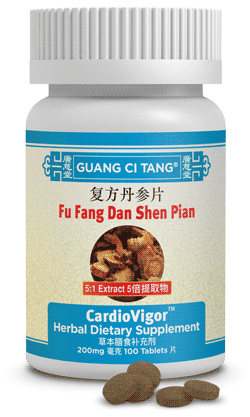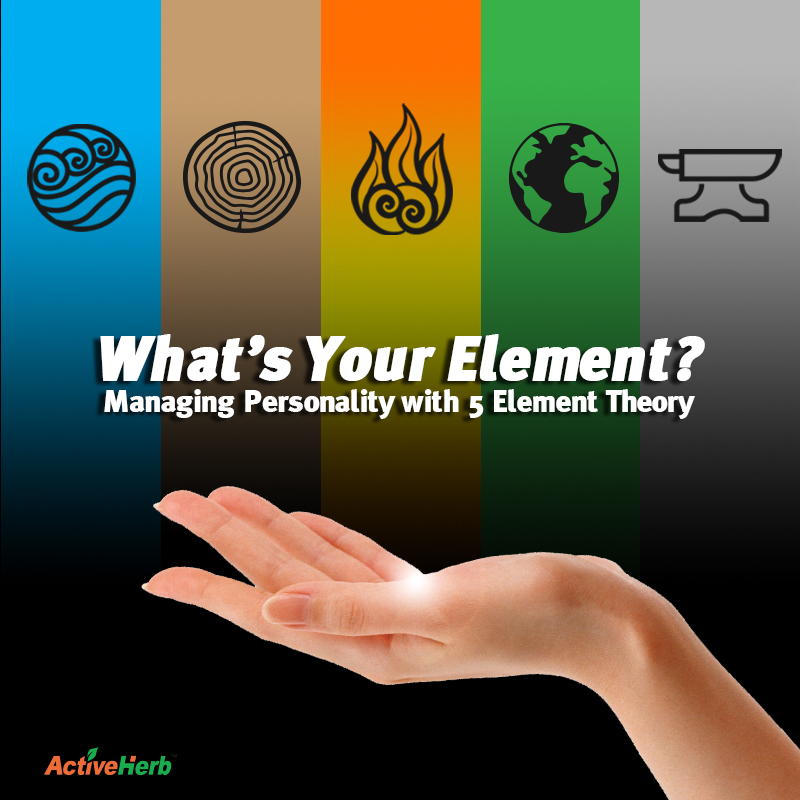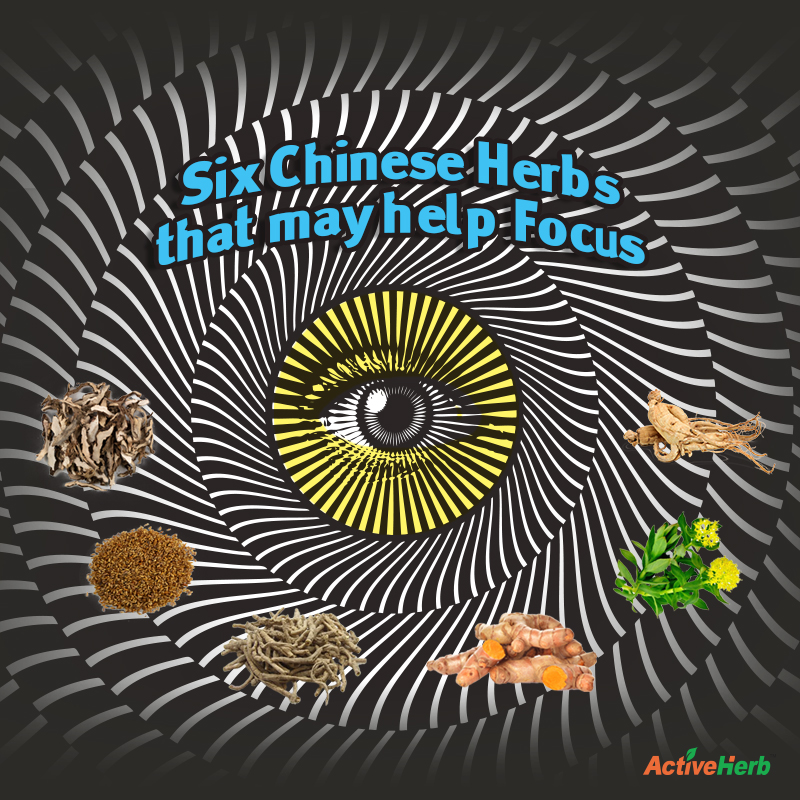Tong Xin Luo: Research Backs This Heart-Friendly Creepy Concoction
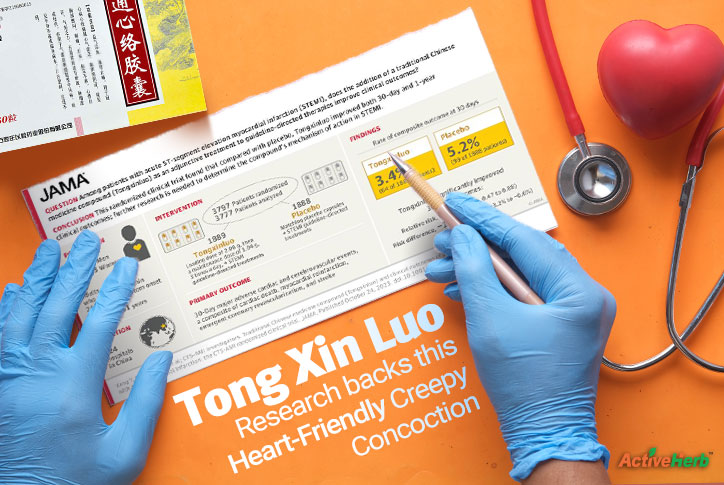
Cockroaches. Scorpions. Cicadas. Centipedes. And leeches, oh my!
These creepy crawlies—and winged menace in the case of cicadas—aren’t just a list of the creatures most likely to induce arachnophobia and entomophobia. They are ingredients in a most peculiar drug in China, approved for the treatment of angina and stroke, that recently got a boost of validation from one of the most prestigious medical journals.
Several clinical trials show that “Tong Xin Luo” supports the cardiovascular system, with the latest research from The Journal of the American Medical Association (JAMA), showing that “TXL” aided in the recovery of a specific type of heart attack.
Would you take Tong Xin Luo to support your heart health even though the ingredients might make your skin crawl? The good news for patients who took it during a randomized clinical trial? They did not have to swallow the nightmare-inducing critters whole; Tong Xin Luo comes in capsule form.
Let’s learn about this most curious compound and its promising results for “collateral diseases” of traditional Chinese medicine (TCM).
Surprising Ingredients, Surprising Results
An article published on TCTMD, an interventional cardiology resource, best summed up the results of a study on Tong Xin Luo. The CTS-AMI trial, a prospective, randomized, double-blind, placebo-controlled, multicenter clinical study in China, involved nearly 3,800 patients from 124 medical centers who previously had experienced a severe type of heart attack called ST-segment elevation myocardial infarction or STEMI.
Writing about a discussion of the CTS-AMI trial at the American Heart Association (AHA) 2022 Scientific Sessions, Shelley Wood of TCTMD said, “It’s not clear what aspect of the trial raised more eyebrows: the dramatically positive effects of traditional Chinese medicine [TXL] in reducing 30-day events post-STEMI or the components of the agent itself.”
One can only imagine the look on the faces of cardiologists attending the conference when CTS-AMI investigator Yuejin Yang MD, PhD listed the ingredients. Jaws likely dropped.
The CTS-AMI was also published in JAMA this past October. That the study was published in JAMA speaks volumes about the validity of the findings on TXL, considering that JAMA is renowned for its rigorous peer-review process in medicine, with a history spanning over a century.
The participants who had experienced STEMI within 24 hours of symptom onset were divided into two groups. One group received TXL orally for 12 months, while the other received a placebo. Both groups also underwent conventional STEMI guideline-directed treatments, i.e. reperfusion therapy, which quickly reopens the blocked coronary artery. (Most STEMI-recovery procedures, however, are out of reach for rural Chinese citizens.)
Back to the study results: The primary focus was on the occurrence of major adverse cardiac and cerebrovascular events within 30 days and up to one year. The findings indicated a significant improvement in outcomes for the TXL group compared to the placebo group. Notably, the TXL group experienced fewer 30-day cerebrovascular events and decreased cardiac deaths. Moreover, these positive effects persisted over the one-year follow-up period.
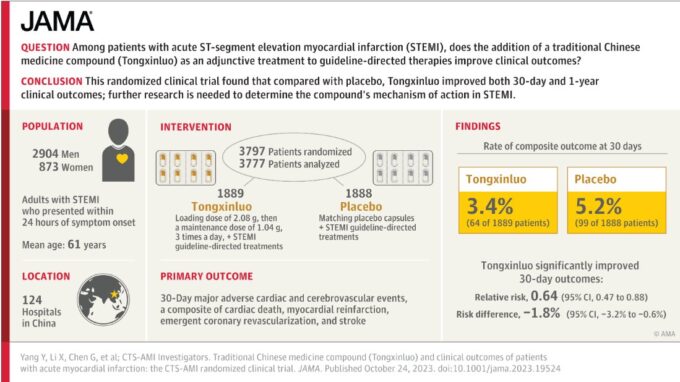
What is STEMI?
It’s a severe heart attack characterized by a sudden blockage in one of the coronary arteries, which is responsible for supplying blood to the heart muscle. This blockage impedes the flow of oxygen-rich blood to a portion of the heart, leading to damage or death of the heart muscle cells. The “ST-segment elevation” refers to changes observed on an electrocardiogram (ECG or EKG), where the ST segment—the flat section between the heart’s contractions—shows an abnormal elevation.
Common symptoms immediately before a STEMI episode include intense chest pain or discomfort, shortness of breath, and sweating. Someone experiencing STEMI requires prompt intervention to restore blood flow and prevent further damage to the heart. Immediate medical attention and interventions such as angioplasty or clot-dissolving medications are crucial in managing STEMI and reducing its potentially life-threatening consequences.
However, as mentioned, if you’re a villager in China experiencing STEMI, angioplasty is not a readily available treatment option. Hence creepy components of crushed cockroaches, scorpions, cicadas, centipedes, beetles, and leeches!
What Other Ingredients Are In Tong Xin Luo?
Snake venom? Black widow guts? Tarantula tonsils?
No, there are no other terrifying ingredients in TXL, which is manufactured by Yiling Pharmaceutical, a company with 10,000 employees, established in 1992, four years before TXL was approved for the treatment of angina and stroke in China by the former China Food and Drug Administration (CFDA), now the National Medical Products Administration (NMPA).
According to Yiling, the list of ingredients in TXL are as follows:
- Ginseng Radix et Rhizoma: Ginseng Root and Rhizome
- Hirudo: Leech
- Scorpio: Scorpion
- Paeoniae Rubra Radix: Red Peony Root
- Periostracum Cicadae: Cicada Molting
- Eupolyphaga seu Steleophaga: Polyphaga Beetle
- Scolopendra: Centipede
- Lignum Santali Albi: White Sandalwood
- Lignum Dalbergiae Odoriferae: Dalbergia Odorifera Wood
- Olibanum (processed): Processed Frankincense
- Ziziphi Spinosae Semen (stir-baked): Stir-Baked Spine Date Seed
- Borneolum Syntheticum: Synthetic Borneol (a camphor-like compound)
How Does TXL Work?
To understand how TXL works, we need to mitigate “collateral damage.” In TCM, the collateral disease theory involves the concept that the body’s energy, or Qi, flows through a network of channels called meridians.
When there is an imbalance or blockage in these meridians, it can lead to health issues. Collaterals, smaller energy pathways branching from the main meridians, are crucial in distributing Qi and Blood (Qi moves Blood) throughout the body. The theory suggests that diseases can arise when these collaterals are affected, disrupting the smooth flow of Qi and causing symptoms.
Thus, TXL capsules may help enhance the flow of Qi and resolve blood stasis in the Heart meridian.
Can You Purchase Tong Xin Luo?
ActiveHerb does not sell TXL because it is a brand name. However, ActiveHerb offers 3 TCM formulas (with no creepy-crawly animal ingredients) that support heart health:
- Blood Stasisclear (Xue Fu Zhu Yu Pian) – Potently invigorates the Blood and removes Blood Stasis.
- CircuFine (Huo Xue Tong Mai Pian) – Supports general blood circulation and cardiovascular health.
- Cardiovigor (Fu Fang Dan Shen Pian) – Maintains healthy heart function.
Not sure which formula is best suited for you? Consult your licensed acupuncturist.
Hopefully, you won’t ever need TXL. Yet, the JAMA study provides the exciting potential of this most curious TCM for post-cardiac event care.
Would you take TXL? Share your thoughts.



